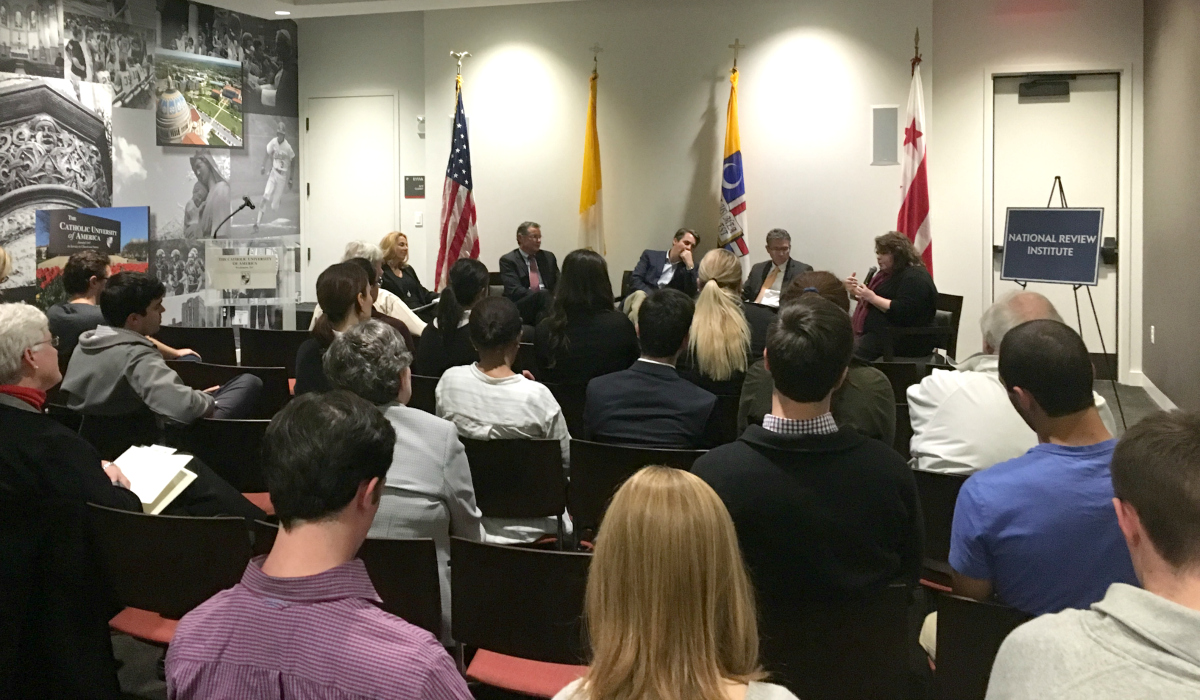

Catholic University’s Institute for Policy Research & Catholic Studies (IPR) hosted two separate events this week examining the election from a Catholic perspective.
On Monday, Oct. 31, the institute hosted “The Catholic Vote 2016,” a panel discussion that analyzed how Catholics have voted historically based on differences in ethnic background, race, age, and gender. Using polling data from the current campaign, the panelists determined that this year’s race between Hillary Clinton and Donald Trump is breaking many pre-established patterns.
The discussion, which took place at the National Press Club in downtown D.C., was moderated by ABC News Commentator Cokie Roberts, and included panelists E.J. Dionne, a political commentator for The Washington Post; Maria Teresa Kumar, president and CEO of Voto Latino; Robert Jones, CEO of the Public Religion Research Institute; and Stephen Schneck, director of IPR and associate professor of politics.
According to Schneck, the idea that Catholics vote in a bloc for one specific candidate over another is a myth.
“For American Catholics who want to follow Church teachings, they face a problem because neither political party is a particularly good fit,” he said. “And then just as American politics has become polarized in the last few decades, that polarization has spilled over into the pews.”
Because Catholics make up one-fifth of the voters in the United States and are even more common in key states such as Pennsylvania, Wisconsin, Arizona, Nevada, and Ohio, their votes cannot be overlooked. Historically, candidates that win the majority of votes from Catholics go on to win the election as a whole, Jones said.
Using polling data from the beginning of the week, Jones said that in this election, Clinton has support from 51% of Catholics compared to 40% for Trump. This is compared to 2012, when there was only a 2% difference in Catholics who preferred Barack Obama over Mitt Romney. Among nonwhite Catholics, the support for Clinton is even stronger with 78% of people preferring her over a mere 17% supporting Trump.
Part of the changing political attitudes of Catholics is a result of the changing demographics of the Church. According to data presented by Schneck, 43% of Catholics today are either first- or second-generation Catholics hailing from Latin America, Africa, the Caribbean, and Asia.
“The Hollywood image of American Catholicism as white ethnics — Irish, Italian, Polish, and so on — that image is less and less an accurate one,” said Schneck. “Catholics in America foreshadow where America as a whole is headed.”
The following evening, IPR hosted a second panel entitled Citizenship and Civility: The Role of Catholics in Rebuilding the American Political Culture.
The discussion was moderated by Kathryn Jean Lopez, an editor-at-large at National Review Online, and included Schneck and Chad Pecknold, associate professor of systematic theology, as well as IPR Fellow Melinda Henneberger, and Jonathan Reyes, executive director of the Department of Justice, Peace, and Human Development at the United States Conference of Catholic Bishops.
The discussion focused on the way the United States electorate participated in the selection of two unpopular candidates and the way the electorate can change in order attract candidates that are more popular.
“When we talk about the unhappiness we have with a Donald Trump or a Hillary Clinton, it is an unhappiness we voted for,” said Pecknold.
On the other hand, some at the discussion argued that civility was not the right virtue to inject into the American political culture.
“I myself am a bit annoyed with the term civility because it is so poorly defined,” said Reyes. “Usually it ends up meaning, ‘everyone calm down’ but can end up leading to civility meaning ‘you aren’t allowed to say anything to make anyone uncomfortable’ and that negates the possibility of helpful political debate.”
Reyes argued that the correct virtue to add to American political culture is humility, which adds respect to the political discourse without removing uncomfortable truths.
Schneck argued that more important than being civil toward each other is allowing for conflict to exist without denying the personhood of those in conflict.
“Conflict is part of political life. When American revolutionaries burned effigies of George III under liberty trees that was not a civil act, but it was an important act that led to needed political change,” said Schneck.
He also noted the unique position that Catholic University has in this election and in the American political culture.
“This event is co-sponsored by the College Democrats and College Republicans here at Catholic University and I think that says something very special about the University,” said Schneck.
More information on other Institute for Policy Research & Catholic Studies events.